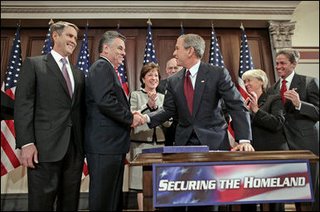
El presidente George W. Bush firmó este viernes 13 una ley dirigida a impedir que los terroristas puedan introducir armas de contrabando dentro de los 11 millones de contenedores que entran a los puertos de EE UU.
El proyecto de ley de seguridad fue aprobado por el Congreso dos semanas antes de que los legisladores salieran para la campaña de las elecciones legislativas del 7 de noviembre.
La nueva ley autoriza el desarrollo de equipos de inspección de alta tecnología, a fin de que en las aduanas sean revisados los contenedores sin ser abiertos, así como la extensión de funciones de la Oficina Nacional de Detección Nuclear, encargada de evitar el ingreso de material considerado una amenaza atómica.
Empero, la nueva ley sólo pone por escºrito muchas cosas que el Departamento de Seguridad Nacional (DHS) han hecho desde el el 11-S.
Al promulgar la ley el presidente norteamericano recordó que la semana pasada firmó el plan de gastos del DHS que otorga un pago inicial de 1,200 millones de dólares para 370 millas de muros, barreras físicas y tecnología para la seguridad fronteriza. "El Congreso también aprobó un proyecto de ley que autoriza la construcción de unas 700 millas de barda doble a lo largo de nuestra frontera sur. Voy a promulgar esa medida", expresó.
Sin embargo, sostuvo: "Seguiré trabajando con el Congreso para aprobar una reforma migratoria integral que proteja a nuestro país, aplique nuestras leyes y sostenga nuestros valores".
Agregó que desde que inició su mandato hasta ahora se han duplicado los fondos de seguridad fronteriza de 4,600 millones de dólares a 9,500 millones de dólares. "Hemos incrementado la cifra de agentes fronterizos de nueve mil a poco más de 12 mil. Hemos actualizado la tecnología y la infraestructura a lo largo de la frontera. Hemos detenido y deportado a más de seis millones de personas que ingresaron de manera ilegal a Estados Unidos. Se trata de un progreso importante, pero nos queda mucho trabajo por hacer".
Sin embargo, pese a los adelantos citados por la Administración, grupos pro inmigrantes y legisladores de ambos partidos coinciden en que la inmigración indocumentada y sus secuelas no podrán enfrentarse de manera efectiva sin una reforma integral que aborde la situación migratoria de los 12 millones de indocumentados en el país y que establezca un plan de trabajadores temporales que absorba futuros flujos migratorios.
Y es curioso pero, aunque Bush dice apoyar la reforma integral no intervino con el Congreso de mayoría republicana que, previo al receso, se concentró en medidas de seguridad. La única medida independiente que aprobó fue, de hecho, la del muro fronterizo.
Es un asunto de politica electorera.
¡Lástima!
Este es el comunicado de la Casa Blanca
President's Statement on H.R. 4954, the "Security and Accountability For Every Port Act of 2006"
Today, I have signed into law H.R. 4954, the "Security and Accountability For Every Port Act of 2006," or the "SAFE Port Act" (the "Act"). The Act strengthens the Government's ability to protect the Nation's seaports and maritime commerce from attack by terrorists.
The executive branch shall construe provisions of the Act that purport to require executive branch officials to submit recommendations for legislation to the Congress, including section 201, in a manner consistent with the President's constitutional authority to recommend for the consideration of the Congress such measures as the President judges necessary and expedient and to supervise the unitary executive branch.
The executive branch shall construe provisions of the Act, including subsection 401(c) and subsection 2(d) of the Act of March 3, 1927, as amended by section 402 of the Act, that purport to make consultation with congressional committees a precondition to execution of the law, to call for but not mandate such consultation, as is consistent with the Constitution's provisions concerning the separate powers of the Congress to legislate and the President to execute the laws.
The executive branch shall construe subsection 301(h)(2) of the Customs Procedural Reform and Simplification Act of 1978, as amended by section 403 of the Act, which purports to give a subordinate official within the executive branch authority to prevent an action by the superior official to whom the subordinate official reports, in a manner consistent with the President's constitutional authority to supervise the unitary executive branch.
The executive branch shall construe subsection 301(h)(2) of the Customs Procedural Reform and Simplification Act of 1978, as amended by section 403 of the Act, which purports to give a subordinate official within the executive branch authority to prevent an action by the superior official to whom the subordinate official reports, in a manner consistent with the President's constitutional authority to supervise the unitary executive branch.
The executive branch shall construe section 709 of the Act, which purports to direct the President to perform the President's duties "acting through" a particular officer, in a manner consistent with the constitutional authority of the President to supervise the unitary executive branch.
The executive branch shall construe as advisory provisions of the Act that purport to direct or burden the conduct of negotiations by the executive branch with foreign governments, international organizations, or other entities abroad, that purport to direct executive branch officials to negotiate with foreign governments or in international organizations to achieve specified foreign policy objectives, or that purport to require the executive branch to disclose deliberations between the United States and foreign countries. Such provisions include subsections 205(d) and (i) and 803(b) of the Act; subsection 431(b) of the Homeland Security Act of 2002, as amended by section 301 of the Act; and subsection 629(h) of the Tariff Act of 1930, as amended by section 404 of the Act. Such provisions, if construed as mandatory rather than advisory, would impermissibly interfere with the President's constitutional authorities to conduct the Nation's foreign affairs, participate in international negotiations, and supervise the unitary executive branch.
GEORGE W. BUSH
THE WHITE HOUSE,
October 13, 2006.
THE WHITE HOUSE,
October 13, 2006.

No hay comentarios.:
Publicar un comentario